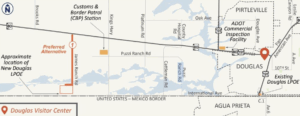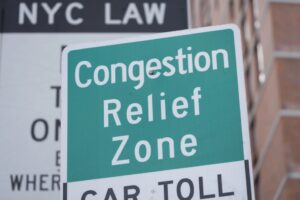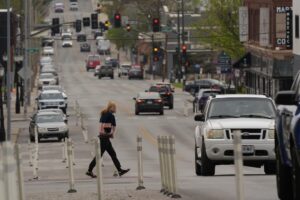LANSING, Mich. — A state panel on Thursday authorized borrowing $3.5 billion to roughly double spending on Michigan road and bridge construction over five years, a step Gov. Gretchen Whitmer said is crucial to start quickly addressing crumbling infrastructure but not a long-term fix.
The State Transportation Commission, which is split evenly among Democrats, Republicans and independents, unanimously endorsed the Democratic governor’s plan a day after she unveiled it in her State of the State speech. The bonds will boost spending on state roads — I-, U.S.- and M-numbered routes — to $7.3 billion between now and September 2024, from more than $3.8 billion.
“Over the long haul we believe we will actually be saving money as a result of this. It’s an important component of any strategy to fix a crisis as big as the one that we’re confronting,” Whitmer said.
She stressed that the additional spending can only go toward the worst state roads and bridges, not ones overseen by local agencies.
“I’m hopeful that the Legislature will get serious about moving forward. I am eager and happy to engage in those talks whenever they are,” Whitmer said.
She does not intend to unveil a new permanent road-funding proposal nearly a year after the Republican-controlled Legislature blocked her proposed 45-cents-a-gallon fuel tax increase. GOP legislative leaders worried that she left the public with the impression that bonding is the solution, even though she clearly said it is not long-term funding.
“I’m concerned that we’ve now got people convinced that she’s magically found money that can take care of roads, and that’s not the case at all,” said Senate Majority Leader Mike Shirkey, of Clarklake.
Whitmer said the Rebuilding Michigan bond proceeds will add or expand 122 major projects, fix high-traffic highways and other roads with the greatest economic impact, save money by avoiding higher construction costs and rebuild rather than patch pavement. Seventy-three future projects will start and end sooner under the revised five-year plan; 49 others will involve rebuilding roads rather than resurfacing them, so that they last longer.
It was unclear if or when Whitmer and Republicans may resume road-funding talks that broke down in September and led to a months-long budget impasse.
Shirkey and House Speaker Lee Chatfield chafed at Whitmer’s claim that they had never countered with a “serious” proposal. They said the state could remove the sales tax on fuel — which primarily goes to schools and municipalities and is not levied in many other states — and pass an equivalent per-gallon tax at the pump dedicated to roadwork, raising $900 million with no tax hike. Funding for education and local governments could stay intact, they said, if the state refinanced and delayed the repayment of debt in the school employees’ retirement system.
“That’s on the table and she needs to respond to that,” Shirkey said.
Whitmer has opposed such a move because it would generate less than the net $1.9 billion she sought and she has concerns about the impact on K-12 funding.
“I don’t consider (it) a serious solution because it’s not full, it’s not dedicated. … You can’t make one problem worse to make a little bit of improvement on another,” she said.
Chatfield, of Levering, pointed to how Whitmer, in her address, said drivers on state roads should know that her administration is fixing them.
“She is wanting a loan to trick the people into thinking that’s a long-term plan so when they see an orange barrel she gets the credit. This not about who gets the credit. This is not about checking off a box from a campaign list,” he said. “This is about fixing the problem and until she fixes the root of the problem” — the sales tax on fuel — “we’re always going to have a road-funding problem in our state.”
Michigan’s annual debt service on past State Trunkline Fund bonds is $118 million this fiscal year and was scheduled to drop gradually and substantially in coming years, to more than $6 million by the 2027-28 budget year. Whitmer’s administration estimated the $3.5 billion in borrowing will cost the state $207 million annually over 25 years.
Former Grand Rapids Mayor George Heartwell, who serves as an independent on the State Transportation Commission, said the bonding is “a smart, cost-effective way to address a looming crisis on our roads. This is not a permanent fix. We still need an increased, dedicated source of revenue from the Legislature to solve the long-term, going -forward problem. But this will put us back on track to fixing our Michigan roads.”
The Associated Press is an independent global news organization dedicated to factual reporting. Founded in 1846, AP today remains the most trusted source of fast, accurate, unbiased news in all formats and the essential provider of the technology and services vital to the news business. The Trucker Media Group is subscriber of The Associated Press has been granted the license to use this content on TheTrucker.com and The Trucker newspaper in accordance with its Content License Agreement with The Associated Press.








